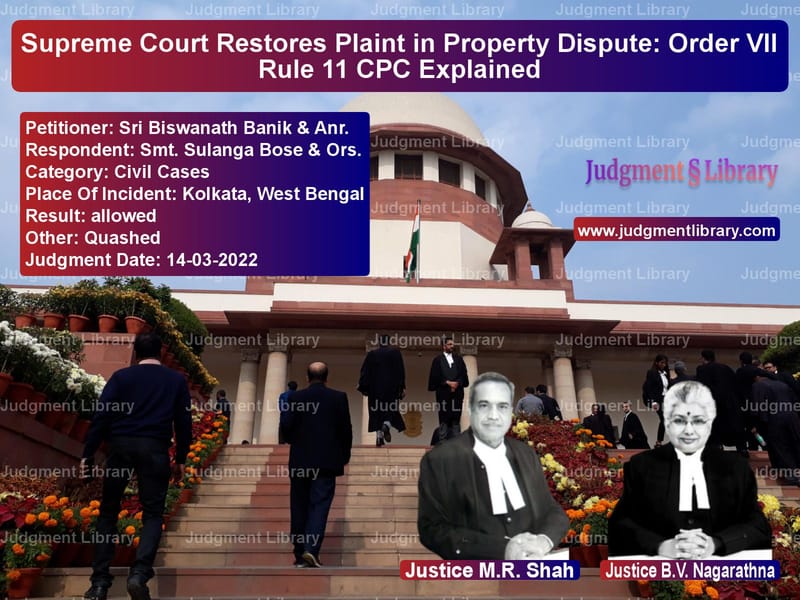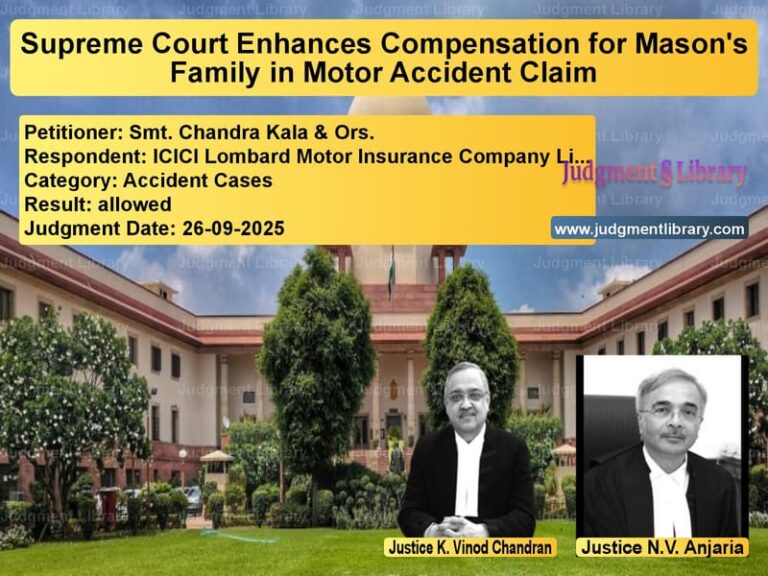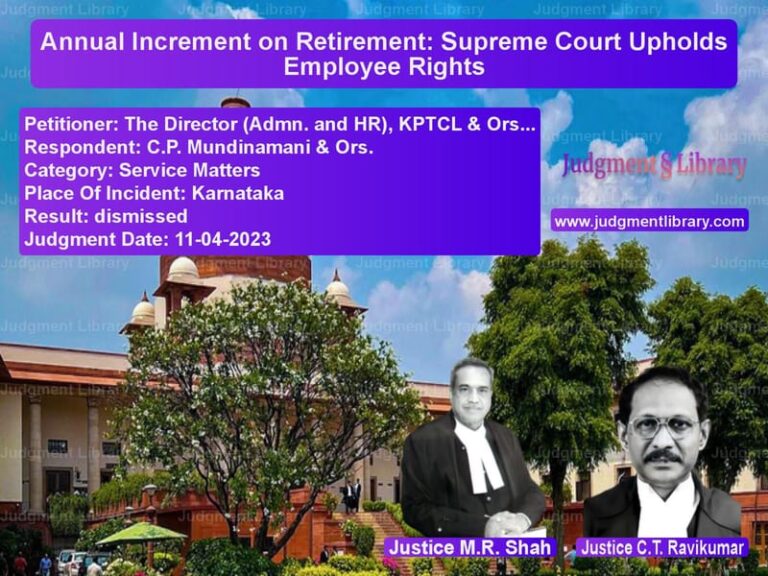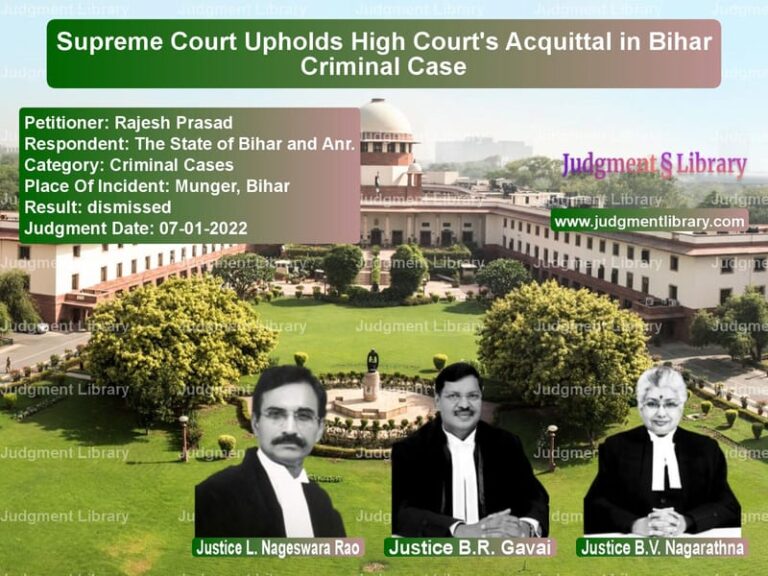Supreme Court Restores Plaint in Property Dispute: Order VII Rule 11 CPC Explained
The case of Sri Biswanath Banik & Anr. vs. Smt. Sulanga Bose & Ors. is a landmark ruling concerning property disputes and the interpretation of Order VII Rule 11 of the Code of Civil Procedure (CPC), 1908. The Supreme Court’s judgment clarifies that a plaint should not be rejected unless it is evident on the face of it that the suit is barred by law.
The case arose from a dispute over the enforcement of an agreement under Section 53A of the Transfer of Property Act, where the appellants claimed possession of the suit property based on part performance of a contract. The Calcutta High Court had rejected the plaint, stating that the suit was barred by limitation. However, the Supreme Court overturned this ruling and restored the trial court’s decision, allowing the case to proceed.
Background of the Case
The dispute dates back to an agreement for sale executed on April 28, 1995, under which the plaintiffs (appellants) claimed possession of the suit property. The plaintiffs filed a suit in 2010, seeking:
- A declaration of their title and interest in the suit property under Section 53A of the Transfer of Property Act.
- A direction to the defendant to execute and register a deed of conveyance.
- A decree of permanent injunction restraining the defendant from interfering with their possession.
The defendant (respondent) contended that the suit was barred by limitation and sought rejection of the plaint under Order VII Rule 11 CPC. The trial court dismissed this application, but the High Court allowed it, leading to the present appeal before the Supreme Court.
Arguments Presented by the Petitioner (Appellant)
The appellant argued:
- The cause of action arose in August 2010, when the defendant attempted to transfer the property to a third party, rather than in 2004, as claimed by the High Court.
- The issue of limitation involved a mixed question of law and fact and could not be decided at the stage of an Order VII Rule 11 CPC application.
- They had continuously possessed the property and paid taxes, which supported their claim under Section 53A of the Transfer of Property Act.
Arguments Presented by the Respondent (Defendant)
The respondent contended:
- The suit was time-barred as the cause of action arose in 2004, when the alleged breach of contract occurred.
- A suit for declaration under Section 53A of the Transfer of Property Act was not maintainable against the rightful owner.
- Once the suit was barred by limitation, it had to be rejected under Order VII Rule 11 CPC.
Supreme Court’s Observations and Verdict
The Supreme Court analyzed whether the plaint could be rejected under Order VII Rule 11 CPC based on the limitation argument. The Court made the following key observations:
- While considering an application under Order VII Rule 11 CPC, the Court must read the plaint as a whole.
- A plaint can only be rejected on limitation grounds if it is clear from the plaint itself that the suit is time-barred.
- The High Court erred in considering only a few lines from the plaint rather than reading it as a whole.
- As per the Supreme Court’s ruling in Ram Prakash Gupta vs. Rajiv Kumar Gupta (2007), a plaint should not be rejected merely on an isolated reading of a passage.
- Since the plaintiffs claimed that the cause of action arose in 2010, the issue of limitation had to be decided at trial.
Based on these findings, the Supreme Court ruled:
- The appeal was allowed.
- The High Court’s order rejecting the plaint was quashed.
- The trial court’s order refusing to reject the plaint was restored.
- The trial court was directed to proceed with the case on its merits.
Legal Precedents Considered
The Supreme Court referred to multiple judgments on Order VII Rule 11 CPC and the issue of limitation:
- Ram Prakash Gupta vs. Rajiv Kumar Gupta (2007): Held that a plaint should not be rejected by selectively reading parts of it.
- Delhi Motor Company vs. U.A. Basrurkar (1968): Established that suits for declaration under Section 53A of the Transfer of Property Act require possession and cannot be filed by those not in possession.
- Bhagwati Prasad vs. Chandramaul (1966): Clarified that limitation is a mixed question of law and fact.
Impact of the Judgment
This ruling has significant implications for property law and civil procedure:
- It clarifies that Order VII Rule 11 CPC should be applied only in cases where the plaint is clearly barred by law.
- It reinforces that limitation issues should generally be decided at trial rather than at the initial stage of litigation.
- It protects plaintiffs from summary rejection of suits without a full hearing on the merits.
- It ensures that claims under Section 53A of the Transfer of Property Act are not dismissed prematurely.
By restoring the plaint, the Supreme Court has upheld the principle that courts must assess cases based on their complete facts and legal arguments rather than rejecting claims prematurely.
Petitioner Name: Sri Biswanath Banik & Anr..Respondent Name: Smt. Sulanga Bose & Ors..Judgment By: Justice M.R. Shah, Justice B.V. Nagarathna.Place Of Incident: Kolkata, West Bengal.Judgment Date: 14-03-2022.
Don’t miss out on the full details! Download the complete judgment in PDF format below and gain valuable insights instantly!
Download Judgment: sri-biswanath-banik-vs-smt.-sulanga-bose-&-supreme-court-of-india-judgment-dated-14-03-2022.pdf
Directly Download Judgment: Directly download this Judgment
See all petitions in Property Disputes
See all petitions in Specific Performance
See all petitions in Judgment by Mukeshkumar Rasikbhai Shah
See all petitions in Judgment by B.V. Nagarathna
See all petitions in allowed
See all petitions in Quashed
See all petitions in supreme court of India judgments March 2022
See all petitions in 2022 judgments
See all posts in Civil Cases Category
See all allowed petitions in Civil Cases Category
See all Dismissed petitions in Civil Cases Category
See all partially allowed petitions in Civil Cases Category







